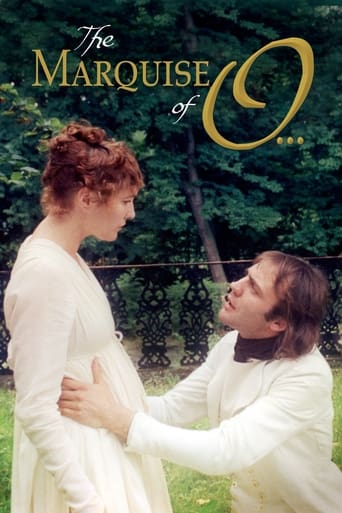Horst in Translation ([email protected])
"Die Marquise von O..." or "The Marquise of O" is a co-production between West Germany and France from 1976, so this one has its 40th anniversary this year. The cast is almost exclusively German, but the writer and director is Éric Rohmer which explains the French involvement. Rohmer was in his 50s at that point and already an Oscar nominee. His 100-minute movie here was based on a Heinrich von Kleist story and is certainly among the writer's most known adaptations in film. I will not mention all the actors in here in detail as you can see them in the cast list, but it can be said that lead actress Edith Clever who plays the title character for a German Film Award for her performance here and so did her male co-lead Bruno Ganz for whom it was the big breakthrough as an actor and he worked with Herzog, Wenders and many other prestigious filmmakers in the years to come. This movie here received lots of awards attention, probably also because German period pieces are really nothing you get to see that frequently.Most of this praise and awards recognition (also like the BAFTA win) had to do with the technical side of the film and also the visual side and I would agree that costumes, sets and cinematography are those areas where the film works the best. Or I could also say "only areas where it works" as I personally was not impressed at all by the viewing. Clever was not really memorable as the main character and being a big Ganz fan, I was disappointed by how he went over-the-top with his performance on some occasion. The costumes gave him enough showiness already and I hoped for more quiet subtlety. Also I felt that Rohmer's story here just wasn't enough for 100 minutes and that he stretched the few crucial plot points )pregnancy, relationship between the two protagonists) until they became really uninteresting to watch from the perspective of the audience. I am very much baffled by this film's success. I cannot deny it. I have not seen (enough) other stuff by Rohmer, which is why I am still undecided if the maker is the problem here or just the subject. But I do know for sure that I cannot recommend the watch here. Thumbs down from me and admittedly I will say that period pieces have never been my favorite genre of film, but still there are more than just a few that I consider superior to this one. Watch something else instead.
jcnsoflorida
Erich Rohmer's adaptation of a novella by Heinrich von Kleist is visually remarkable. If you can imagine a painting by Jacques Louis David come to life, that is what this film looks like. Clearly a lot of attention was paid to colors and lighting. Aficionados of neoclassicism should not miss it. I believe this was Bruno Ganz's first film and the other players, particularly Edith Clever, are fine as well. The tone is one of social satire tempered by comedy. A number of Netflix viewers have complained that the film requires a lot of patience. I don't agree. It requires an interest in the period, perhaps. Recommended for the discerning.
zetes
Not one of Rohmer's best, especially from a writing standpoint. It seems to me that he wasn't particularly interested in this project, or at least he is unable to make the story as interesting as I find most of his other films. However, several points elevate this film far beyond what it could have been. First thing, the cinematography, by Néstor Almendros, is stunning. Rohmer pays particular attention to the composition, something which he isn't generally known for. I think it hurts the film, but one thing can't be denied: it looks as painterly as possible. Also, the performances are generally great. Bruno Ganz kind of disappointed me, but that's mainly because I consider him one of the greatest actors. His performance here is good, but not at the level of the other films in which I've seen him. On the other hand, the star of the film, Edith Clever, is amazing as the titular character. She becomes pregnant even though she has not had relations with a man since her husband died a couple of years earlier. She must face the prejudices of the time (a good story of a woman up against society, though it's been done better before). The Marquise's parents are played by Peter Lühr and Edda Seippel, and they both give excellent performances as well. All in all, a beautiful experience, if not the most exciting.
Purple X
Eric Rohmer, the great filmmaker, tries his hand at the kind of film that is everything that a Rohmer film isn't. Gone is the New Wave Modernism; the natural settings, hand-held cameras and dialogue that captures the quintessential nature of being human. Replaced instead with dowdy costumes, unmoving camera, and formal sets. Perhaps the original German flows with eloquent charm, but the English subtitles seem to have been translated by school children.Merchant Ivory this isn't, and neither is it Rohmer.

